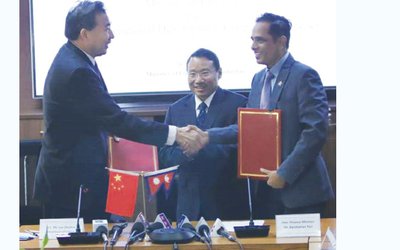Nepal Law Commission is still in the early stage of its evolution. It is in the process of completing its setup and getup. Frankly speaking, the government is yet to allocate adequate resources to the commission. There is a lack of manpower as well. Despite all these lacunas, Nepal Law Commission has been fulfilling its objectives by drafting laws on its own. The commission itself sends the laws to various ministries as required by them. Similarly, it also drafts the laws as per the request of other government offices. The commission also assists the government to draft the model laws. Although short, the history of this institution is a proud one.
The legislature passed the Nepal Law Commission Act to make it an independent, impartial and free institution. The act also envisages that the commission should be legally capable to draft laws, stresses legally capable and experienced experts to be a member of the commission. Despite such inner visions of the legislators, we are unable to achieve the goals. For instance, the act talks about the need to have a research section, but we don’t have one. Similarly, our job is to draft the laws. Without legal draft experts, we cannot do this.
In the changing context, every government makes policies in the first place and later the country drafts the law. However, the situation in Nepal is different. We draft the law and later formulate the policies. This is creating problems. We draft the law without having proper knowledge including why does the country need such laws. In formulating the laws, we rarely consult experts and stakeholders, but various other persons will be involved in implementing the laws. Just recently, the government issued an ordinance to provide state facilities to the former prime ministers, ministers and high level security officials. Of course, every government in the world can promulgate the ordinance in case there is no parliament. This ordinance should be sent to parliament within six months. However, the context in Nepal is different and the government promulgates the ordinance randomly without wider consultations with various stakeholders. Such ordinances address the short term interest of the government and ignore the longer interests. This is not a good culture for the country. We should make these arrangements through regular processes instead.
The commission needs highly qualified members because they need to have broader knowledge on various forms of laws. The laws are of several kinds like corporate law, administrative law, criminal law, constitutional law. For instance, within the corporate law, there are taxation laws. Law commission deals with various drafts of the law. Thus, it requires teams of experts. In other countries, members of Law Commission are full timers and the offices are updated as per the need. The institution is made resourceful. Along with the manpower, it is also given resources. The job of the commission is to conduct research and advise the government to formulate the laws. If the government wants to give value to Nepal Law Commission, the commission must be constituted with expert members. Not only the members, there is also the need to look at the staffing. It is unfortunate that we don’t have staffs. There is no provision for training. One needs regular refresher training conducted from time to time. There is no orientation program for our office bearers and training for other employees. There is no provision for executive level orientation for them also. There is the need to hold workshop, training and orientation. Our organization does not have such things. It is a reality that we are not working, because we are just saying that we don’t have resources. Of course, the commission is doing more than what one expects in the limited conditions. The office bearers and staffs should have done much better than what we are expecting. We are following the principle of rule of law like subjection before law and equality before law. It is unfortunate that the law is on a low profile. One must take in mind that the country cannot go without law. Whether the issue be that of law and order or development or anything else, all these are governed by laws. The law is universal and it has greater importance in society. Every society needs law. Due to our failure to understand the importance of law, we try to interpret the laws as per our wishes. We don’t have adequate knowledge of law. This is happening because we table the bill without sending it to broader audiences for discussions. We rarely interact with the people on the concerned laws. We immediately implement the law soon after sealing it. We don’t give even the time to the people to think about the law. However, due to our own system, people are sent to prison without his/her knowledge. We have disseminated to the people why we need the laws. The point is Nepal Law Commission can do all these things given resources and manpower for this. I am not saying that the government cannot make law as per its demand but what I mean is Law Commission’s expertise can help the government to make the act acceptable and timely. As there is a general lack of resources and trained manpower in the government, Non-governmental Organizations are taking an active lead. This is good. However, every organization has its own class behavior and NGOs too are not an exception.
This way, NGOs sector promotes the laws as per its own class behavior. As the government has established Nepal Law Commission to draft the law, it should be strengthened as per the objectives of the commission’s act.
At a time when Nepal’s traditional mail delivery system is too slow, it takes them months and months to reach the law through the mail delivery. One cannot get the pardon saying that for a person’s ignorance about the law. Realizing the need to disseminate existing constitutions, laws, regulations, orders, policies, Nepal Law Commission has set up a website where people find almost all the existing laws, regulations and constitutions, orders and policies. Besides, the website also includes previous constitutions and laws. This access is open to all. We are in the process of placing all the necessary legal documents on our website. One of the problems we have been facing is to update the laws. As a series of amendments to the regulations happen, it is very difficult to give all the updates and details. Despite all these difficulties, we have been able to place the laws related to documents in our website.
Along with the Nepali version, we are also adding laws in English. One of the aims of placing Nepalese laws in English transition is to make our legal system accessible to other language speakers too. By placing Nepalese laws translated in English, the commission website has been helping foreigners, including investors to know about Nepal’s legal system. We have already placed a large number of laws and regulations on it. Along with contemporary laws and regulations, the commission’s website includes the legal system that prevailed during the Lichchhavi, Malla and Shah periods. The process of updating the laws in our website continues. This website also helps researchers to understand Nepal’s legal system as well as the transformation of Nepalese society in various stages. Law helps to understand the society that existed in various times, including the exercise of authorities and modalities. For instance, the law can tell what the society liked during the period of monarchy or the present republican system. This helps one to know social, political and economic aspects. One can find this in our archive sections. I cannot claim that we have done enough work but what I can say is that the Commission has done something which contributes in the legal history of Nepal.
(Karki is a secretary at Nepal Law Commission. As told to New Spotlight)
- TANAHU HYDROPOWER PROEJCT: A Significant Achievement
- Apr 15, 2024
- AMBASSADOR HANAN GODAR: Sharing Pain With A Nepali Family
- Mar 30, 2024
- VISIT OF KfW AND EIB TO NEPAL : Mission Matters
- Mar 25, 2024
- NEPAL BRITAIN SOCIETY: Pratima Pande's Leadership
- Mar 24, 2024
- NEPAL ARMY DAY: Time To Recall Glory
- Mar 15, 2024
















